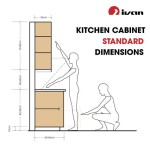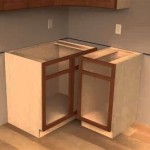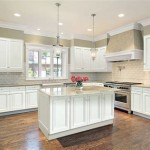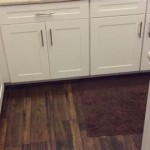How To Build A Soffit Over Kitchen Cabinets
Building a soffit over kitchen cabinets can enhance the aesthetic appeal of a kitchen while providing valuable hidden storage space. This article will provide a comprehensive guide to constructing a soffit, outlining the necessary steps and considerations for a successful project.
Planning and Preparation
Careful planning is crucial for a smooth construction process. Begin by accurately measuring the area above the cabinets where the soffit will be installed. This includes the length, width, and desired height of the soffit. Create a detailed sketch or blueprint that includes these dimensions. Determine the type of materials to be used, such as plywood, MDF, or drywall, considering factors like durability, cost, and aesthetic preferences. Finally, gather all necessary tools and materials, including a measuring tape, level, saw, drill, screws, nails, wood glue, and safety equipment.
Framing the Soffit
The framework provides the structural support for the soffit. Use 2x4 lumber to create a frame that matches the dimensions outlined in the plan. Secure the frame to the wall studs and the top of the kitchen cabinets using screws. Ensure the frame is level and plumb to prevent issues with the finished soffit appearance. Reinforce the frame with additional vertical supports, especially for longer spans, to prevent sagging. Double-check all measurements and adjustments before proceeding to the next step.
Installing the Soffit Facing
The soffit facing provides the visible surface. Cut the chosen material, whether plywood, MDF, or drywall, to fit the frame precisely. Attach the facing material to the frame using screws or nails, ensuring a flush and even surface. Use wood glue for added strength and stability. If using drywall, apply joint compound to cover screw holes and seams, creating a smooth finish. Sand the dried joint compound for a seamless appearance. Prime and paint the soffit facing to match the kitchen decor.
Electrical and Lighting Considerations
If incorporating recessed lighting or other electrical fixtures, plan the wiring before installing the soffit facing. Run the necessary wiring through the framing, ensuring it meets all local building codes. Install electrical boxes and connect the fixtures according to the manufacturer's instructions. Test all electrical connections thoroughly before completing the soffit installation. Consider adding under-cabinet lighting to further enhance the kitchen's ambiance.
Finishing Touches
After the main construction is complete, focus on the finishing details. Install crown molding or other decorative trim to enhance the soffit's appearance and create a seamless transition with the existing cabinetry. Caulk any gaps or seams between the soffit, walls, and cabinets for a polished look. Touch up any paint imperfections for a professional finish. Thoroughly clean the area around the soffit, removing any dust or debris from the construction process.
Adding Storage to the Soffit
One of the primary advantages of a soffit is the potential for additional storage. If desired, install cabinet doors on the face of the soffit to access this space. Choose doors that complement the existing kitchen cabinets. Install hinges and handles appropriate for the size and weight of the doors. Consider adding internal shelving or organizers within the soffit space for efficient storage of kitchen items.
Maintaining the Soffit
Regular maintenance will prolong the life and appearance of the soffit. Regularly dust and clean the soffit surfaces. Inspect the soffit for any signs of damage, such as cracks or water stains, and address them promptly. Repaint the soffit as needed to maintain its fresh appearance. Ensure proper ventilation in the kitchen to prevent moisture buildup, which can damage the soffit material. Periodically check the electrical fixtures within the soffit to ensure they are functioning correctly.
Safety Precautions
Safety should be a top priority throughout the project. Always wear appropriate safety glasses and a dust mask when cutting and sanding materials. Use caution when working with power tools and follow the manufacturer's instructions. Ensure proper ventilation when working with paints, stains, and other chemicals. Have a helper assist with lifting and maneuvering heavy materials, if necessary. Turn off power to the circuit before working with any electrical wiring.
/102333281-f5b5b730e6bd4fa8a55937a4ab4cc97a.jpg?strip=all)
Your Guide To Building A Soffit For Kitchen Cabinets

Diy Kitchen Soffit Makeover How To Disguise A Average But Inspired

Diy Kitchen Soffit Makeover How To Disguise A Average But Inspired
:strip_icc()/SCDW_052_06-a4046ac5dc6b443fb391590b3c475737.jpg?strip=all)
Your Guide To Building A Soffit For Kitchen Cabinets

A Kitchen Soffit Can Fill In The Space Above Wall Cabinets

Diy Kitchen Soffit Makeover How To Disguise A Average But Inspired

Diy How To Disguise A Kitchen Soffit Pink Little Notebookpink Notebook

How To Disguise Your Kitchen Soffit O Hanlon Remodeling

Diy Kitchen Soffit Makeover How To Disguise A Average But Inspired

Design Alternatives To Kitchen Cabinet Soffits
Related Posts








